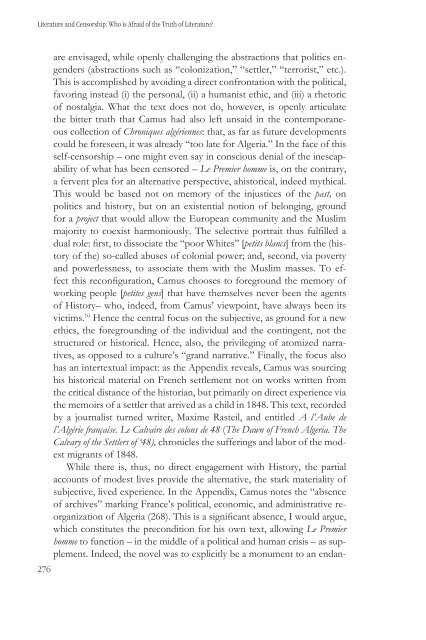Literatura in cenzura - Društvo za primerjalno književnost - ZRC SAZU
Literatura in cenzura - Društvo za primerjalno književnost - ZRC SAZU
Literatura in cenzura - Društvo za primerjalno književnost - ZRC SAZU
- No tags were found...
Create successful ePaper yourself
Turn your PDF publications into a flip-book with our unique Google optimized e-Paper software.
Literature and Censorship: Who is Afraid of the Truth of Literature?276are envisaged, while openly challeng<strong>in</strong>g the abstractions that politics engenders(abstractions such as “coloni<strong>za</strong>tion,” “settler,” “terrorist,” etc.).This is accomplished by avoid<strong>in</strong>g a direct confrontation with the political,favor<strong>in</strong>g <strong>in</strong>stead (i) the personal, (ii) a humanist ethic, and (iii) a rhetoricof nostalgia. What the text does not do, however, is openly articulatethe bitter truth that Camus had also left unsaid <strong>in</strong> the contemporaneouscollection of Chroniques algériennes: that, as far as future developmentscould be foreseen, it was already “too late for Algeria.” In the face of thisself-censorship – one might even say <strong>in</strong> conscious denial of the <strong>in</strong>escapabilityof what has been censored – Le Premier homme is, on the contrary,a fervent plea for an alternative perspective, ahistorical, <strong>in</strong>deed mythical.This would be based not on memory of the <strong>in</strong>justices of the past, onpolitics and history, but on an existential notion of belong<strong>in</strong>g, groundfor a project that would allow the European community and the Muslimmajority to coexist harmoniously. The selective portrait thus fulfilled adual role: first, to dissociate the “poor Whites” [petits blancs] from the (historyof the) so-called abuses of colonial power; and, second, via povertyand powerlessness, to associate them with the Muslim masses. To effectthis reconfiguration, Camus chooses to foreground the memory ofwork<strong>in</strong>g people [petites gens] that have themselves never been the agentsof History– who, <strong>in</strong>deed, from Camus’ viewpo<strong>in</strong>t, have always been itsvictims. 10 Hence the central focus on the subjective, as ground for a newethics, the foreground<strong>in</strong>g of the <strong>in</strong>dividual and the cont<strong>in</strong>gent, not thestructured or historical. Hence, also, the privileg<strong>in</strong>g of atomized narratives,as opposed to a culture’s “grand narrative.” F<strong>in</strong>ally, the focus alsohas an <strong>in</strong>tertextual impact: as the Appendix reveals, Camus was sourc<strong>in</strong>ghis historical material on French settlement not on works written fromthe critical distance of the historian, but primarily on direct experience viathe memoirs of a settler that arrived as a child <strong>in</strong> 1848. This text, recordedby a journalist turned writer, Maxime Rasteil, and entitled A l’Aube del’Algérie française. Le Calvaire des colons de 48 (The Dawn of French Algeria. TheCalvary of the Settlers of ‘48), chronicles the suffer<strong>in</strong>gs and labor of the modestmigrants of 1848.While there is, thus, no direct engagement with History, the partialaccounts of modest lives provide the alternative, the stark materiality ofsubjective, lived experience. In the Appendix, Camus notes the “absenceof archives” mark<strong>in</strong>g France’s political, economic, and adm<strong>in</strong>istrative reorgani<strong>za</strong>tionof Algeria (268). This is a significant absence, I would argue,which constitutes the precondition for his own text, allow<strong>in</strong>g Le Premierhomme to function – <strong>in</strong> the middle of a political and human crisis – as supplement.Indeed, the novel was to explicitly be a monument to an endan-
















